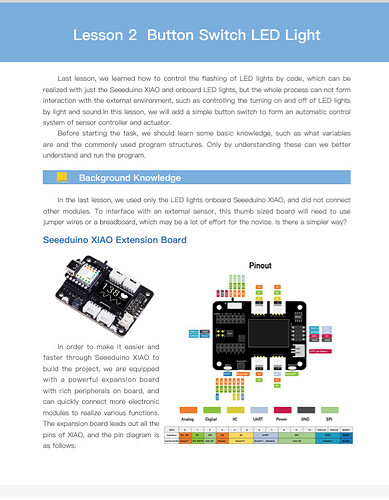Hi, I am unsure if I am doing this correctly, but I wanted to use my xiao expansion board with its button connected to D1 or GPIO_2 and when that button is clicked, wake the esp32s3 from deep sleep. I am trying to modify the exisiting demo code and I cant seem to get the functionality working. When I click the button, nothing seems to happen. I have attached the code below and I have tried pulling the pin high and the pin low and I cant get the deep sleep working with the button. I have however got the button working on its own with some debouncing to make sure the button works so any advice will be appreciated:
#define BUTTON_PIN_BITMASK 0x4 // 2^2 in hex
RTC_DATA_ATTR int bootCount = 0;
/*
Method to print the reason by which ESP32
has been awaken from sleep
*/
void print_wakeup_reason(){
esp_sleep_wakeup_cause_t wakeup_reason;
wakeup_reason = esp_sleep_get_wakeup_cause();
switch(wakeup_reason)
{
case ESP_SLEEP_WAKEUP_EXT0 : Serial.println("Wakeup caused by external signal using RTC_IO"); break;
case ESP_SLEEP_WAKEUP_EXT1 : Serial.println("Wakeup caused by external signal using RTC_CNTL"); break;
case ESP_SLEEP_WAKEUP_TIMER : Serial.println("Wakeup caused by timer"); break;
case ESP_SLEEP_WAKEUP_TOUCHPAD : Serial.println("Wakeup caused by touchpad"); break;
case ESP_SLEEP_WAKEUP_ULP : Serial.println("Wakeup caused by ULP program"); break;
default : Serial.printf("Wakeup was not caused by deep sleep: %d\n",wakeup_reason); break;
}
}
void setup(){
Serial.begin(115200);
delay(1000); //Take some time to open up the Serial Monitor
//Increment boot number and print it every reboot
++bootCount;
Serial.println("Boot number: " + String(bootCount));
//Print the wakeup reason for ESP32
print_wakeup_reason();
/*
First we configure the wake up source
We set our ESP32 to wake up for an external trigger.
There are two types for ESP32, ext0 and ext1 .
ext0 uses RTC_IO to wakeup thus requires RTC peripherals
to be on while ext1 uses RTC Controller so doesnt need
peripherals to be powered on.
Note that using internal pullups/pulldowns also requires
RTC peripherals to be turned on.
*/
esp_sleep_enable_ext0_wakeup(GPIO_NUM_2,1); //1 = High, 0 = Low
//If you were to use ext1, you would use it like
//esp_sleep_enable_ext1_wakeup(BUTTON_PIN_BITMASK,ESP_EXT1_WAKEUP_ANY_HIGH);
//Go to sleep now
Serial.println("Going to sleep now");
esp_deep_sleep_start();
Serial.println("This will never be printed");
}
void loop(){
//This is not going to be called
}
This is my debounce code:
#include <Arduino.h>
#include <U8x8lib.h>
// OLED Display setup
U8X8_SSD1306_128X64_NONAME_HW_I2C u8x8(/* reset= */ U8X8_PIN_NONE);
// Pin configurations
const uint8_t buttonPin = 2;
// Debounce variables
const unsigned long debounceDelay = 50; // Debounce time in milliseconds
volatile unsigned long lastDebounceTime = 0; // Last time the button state changed
// Button states
enum class ButtonState : uint8_t {
Released, // Button released
Pressed // Button pressed
};
volatile ButtonState buttonState = ButtonState::Released; // Current state of the button
volatile bool buttonPressed = false; // Flag indicating if the button is currently pressed
unsigned long buttonPressedTime = 0; // Time when the button was pressed
// Display duration when debugging (5s)
const unsigned long debugDisplayTime = 5000;
void updateDisplay();
void handleButtonPress();
void setup() {
u8x8.begin(); // Initialize OLED display
u8x8.setFlipMode(1); // Set display rotation
Serial.begin(115200); // Initialize serial communication
pinMode(LED_BUILTIN, OUTPUT); // Set built-in LED pin as output
pinMode(buttonPin, INPUT_PULLUP); // Set button pin as input with internal pull-up resistor
attachInterrupt(digitalPinToInterrupt(buttonPin), handleButtonPress, CHANGE); // Attach interrupt for button press detection
}
void loop() {
if (buttonPressed) {
unsigned long currentTime = millis();
if (currentTime - buttonPressedTime >= debugDisplayTime) {
buttonPressed = false; // Reset button press flag
u8x8.clearDisplay(); // Clear display
digitalWrite(LED_BUILTIN, HIGH); // Turn off built-in LED
} else {
updateDisplay(); // Update OLED display
}
} else {
u8x8.clearDisplay(); // Clear display if button not pressed
}
}
void updateDisplay() {
u8x8.setFont(u8x8_font_chroma48medium8_r); // Set font
u8x8.setCursor(0, 0); // Set cursor position
u8x8.print("Button Pressed"); // Print message on display
}
void handleButtonPress() {
unsigned long currentTime = millis();
if ((currentTime - lastDebounceTime) > debounceDelay) {
buttonState = (digitalRead(buttonPin) == HIGH) ? ButtonState::Released : ButtonState::Pressed;
if (buttonState == ButtonState::Pressed) {
Serial.println("Button Pressed");
digitalWrite(LED_BUILTIN, LOW); // Turn on built-in LED
buttonPressed = true; // Set button pressed flag
buttonPressedTime = currentTime; // Record button press time
} else {
digitalWrite(LED_BUILTIN, HIGH); // Turn off built-in LED
}
lastDebounceTime = currentTime; // Record last debounce time
}
}
